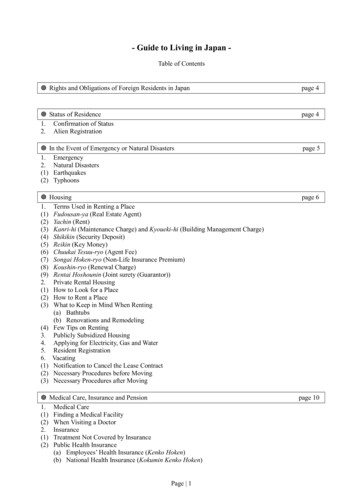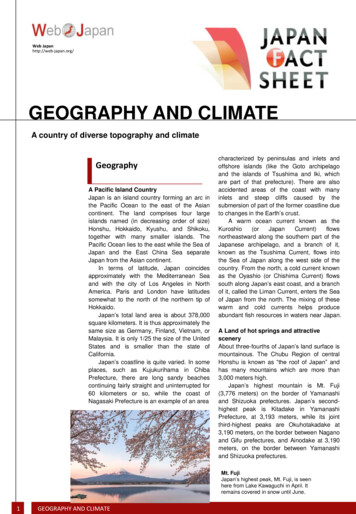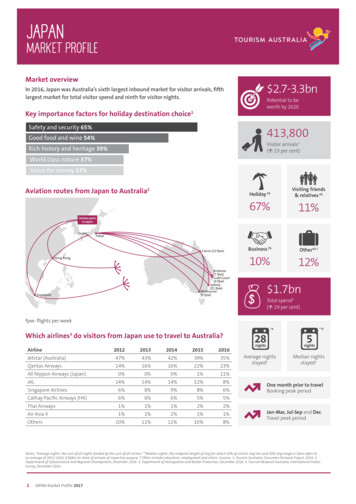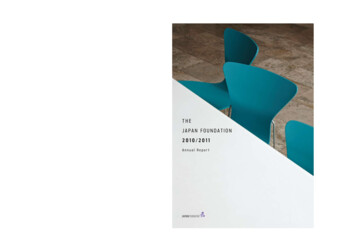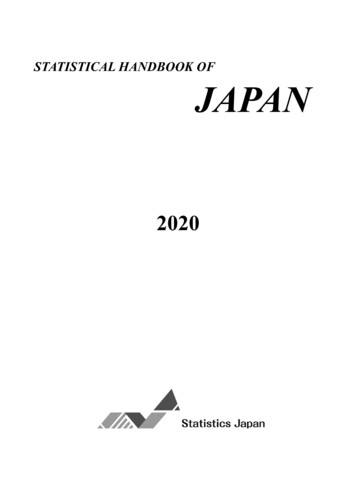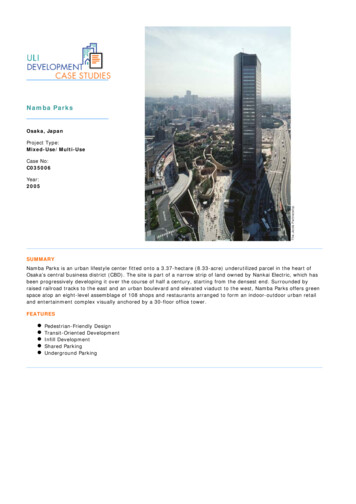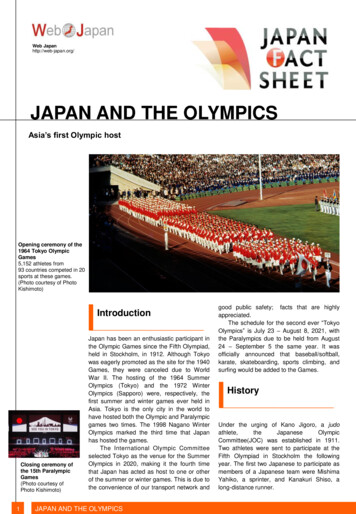
Transcription
Web Japanhttp://web-japan.org/JAPAN AND THE OLYMPICSAsia’s first Olympic hostOpening ceremony of the1964 Tokyo OlympicGames5,152 athletes from93 countries competed in 20sports at these games.(Photo courtesy of PhotoKishimoto)IntroductionClosing ceremony ofthe 15th ParalympicGames(Photo courtesy ofPhoto Kishimoto)1Japan has been an enthusiastic participant inthe Olympic Games since the Fifth Olympiad,held in Stockholm, in 1912. Although Tokyowas eagerly promoted as the site for the 1940Games, they were canceled due to WorldWar II. The hosting of the 1964 SummerOlympics (Tokyo) and the 1972 WinterOlympics (Sapporo) were, respectively, thefirst summer and winter games ever held inAsia. Tokyo is the only city in the world tohave hosted both the Olympic and Paralympicgames two times. The 1998 Nagano WinterOlympics marked the third time that Japanhas hosted the games.The International Olympic Committeeselected Tokyo as the venue for the SummerOlympics in 2020, making it the fourth timethat Japan has acted as host to one or otherof the summer or winter games. This is due tothe convenience of our transport network andJAPAN AND THE OLYMPICSgood public safety; facts that are highlyappreciated.The schedule for the second ever “TokyoOlympics” is July 23 – August 8, 2021, withthe Paralympics due to be held from August24 – September 5 the same year. It wasofficially announced that baseball/softball,karate, skateboarding, sports climbing, andsurfing would be added to the Games.HistoryUnder the urging of Kano Jigoro, a judoathlete,theJapaneseOlympicCommittee(JOC) was established in 1911.Two athletes were sent to participate at theFifth Olympiad in Stockholm the followingyear. The first two Japanese to participate asmembers of a Japanese team were MishimaYahiko, a sprinter, and Kanakuri Shiso, along-distance runner.
Though the next games were to be held in1916, they were canceled due to World War I.By the 1920 Games at Antwerp, Japan fieldeda team of 15 and earned its first awards: apair of silver medals in singles and doublestennis.At the 1928 Games in Amsterdam, Japantook its first two gold medals, in track and fieldand swimming. Athlete Hitomi Kinue becamethe first woman to join a Japanese Olympiccontingent. She received a silver medal in the800-meter running event, and her successencouraged more women to take upcompetitive sports.A contingent of 131 members representedJapan at the 1932 Games in Los Angeles,including 16 women. Japanese athletesearned a total of 7 gold, 7 silver, and 4 bronzemedals in track and field, swimming,equestrian events, and field hockey.At the 1936 Games in Berlin, Japanfielded one of the largest teams in its history:249 athletes, including 17 women. The eventswere broadcast live via a Nippon Hoso Kyokai(NHK; Japan Broadcasting Corporation) radiolinkup, and enthusiastic fans tuned into theirradio sets late into the night (because of thetime difference between Japan and Europe)to listen to the athletes’ progress. At Berlin,swimmer Maehata Hideko became the firstJapanese woman to take a gold medal inOlympic competition by winning the 200meter breaststroke event.In 1936, the International OlympicCommittee (IOC) designated Tokyo andSapporo as the venues for the Summer andWinter Games, respectively, to be held in1940. However, the Tokyo Olympic Gameswere canceled because of World War II; theLondon Olympic Games to be held in 1944were also suspended for the same reason,being realized at last in 1948.Japan was not invited to participate in the1948 Games in London, but was readmittedto the International Olympic Committee in1951, and sent a team of 72 athletes to the1952 Games in Helsinki. A team of 101 menand 16 women traveled to Melbourne in 1956,and won a total of 19 medals, including 4golds.In 1960, Japan organized a large team of147 men and 20 women to take part in theRome Olympics. At the closing ceremonies,2JAPAN AND THE OLYMPICSathletes from the 83 participating countrieswere reminded that in four years’ time, theywould be meeting again in Tokyo.The Tokyo Games andBeyondIn 1952, the postwar military occupation ofJapan came to an end, and Japan made a bidto the IOC for Tokyo to host the SeventeenthOlympiad, to be held in 1960. The bid waswon by Rome, but Japan was notdiscouraged. In October 1955, the TokyoMetropolitan Legislature approved a decisionto bid on hosting the Eighteenth Olympiad, tobe held in 1964.A Japanese delegation visited Munich,Germany, for the fifty-sixth meeting of the IOC.Japan had set its hopes on winning the rightto host the games and waged an aggressivecampaign to wrest votes from rivals Detroitand Vienna. Finally on May 26, 1960, the IOCdelegates put the matter to a vote.For Japan, the hosting of the EighteenthOlympiad in October 1964 was a historicallandmark event that signified the end of thepostwarreconstructionperiodandunderscored Japan’s high economic growth.During the five years leading up to 1964,preparationsforthegamesliterallytransformed the face of Tokyo. Roads in thecity and suburbs were widened. A hugeOlympic Village sprang up in Yoyogi, andNHK built a new broadcast center nearby tocover the event. Total expenditures inpreparation for the event were said to be thehighest in Olympic history.But perhaps the greatest showpieceproject associated with the Olympics was theShinkansen bullet train—billed as the world’sfastest—which began service between Tokyoand Osaka on October 1, nine days prior tothe start of the games.The Tokyo Games attracted 5,152participants from 93 nations. Sixteen nationalcontingents, mainly from developing countries,participated in the Olympics for the first time.The opening ceremony on October 10recorded an 84.7% television viewer rating.As host nation, Japan sent the largestteam it had ever organized: 294 men and 61
Yoshida SaoriYoshida Saori won gold medals in three consecutiveOlympics starting with the 2004 Athens Games. Shereceived the People’s Honor Award in 2012.(Photo courtesy of Photo Kishimoto)The ShinkansenSo-called bullet trainwas first launched in theyear of Tokyo Olympic,1964.women. Urged on by rousing cheers fromtheir compatriots, Japanese athletes tookmedals in boxing, gymnastics, wrestling, trackand field, weightlifting, and shooting. One ofthe most emotional events of the games wasin women’s volleyball, where the Japaneseteam won a hard-fought victory over theSoviet Union to take the gold medal.Also at the Tokyo Games, a nativeJapanese sport—judo—was included as anOlympic event (men only) for the first time.Japanese athletes took gold medals in allweight classes except the unlimited division,which went to the Netherlands.The Tokyo Games saw the establishing of47 new world records and 111 Olympicrecords. The 16 gold, 5 silver, and 8 bronzemedals earned by the Japanese team markedits best Olympic performance in history,placing Japan third in the overall medalstandings behind the United States and theSoviet Union.The ParalympicsUchimura KoheiWinner of the gold medalin men's all-aroundgymnastics3The Tokyo Games also saw the secondParalympic Games held after Rome in 1960.Although Japan had only 16 para athletes atthe event, Yasunori Igari and Fujio Watanabetook home Japan's first Paralympic goldmedal for table tennis. Medals were also wonfor archery, dartchery, swimming andwheelchair fencing.The Nagano Paralympic in 1998 was thefirst time that a winter Paralympic was heldoutside of Europe, and was the 7th in history.More than 560 para-athletes participated inNaganowinterParalympicandthisrepresented the largest number of paraathletes to compete in a winter Paralympic.There were 70 participants from Japan, and itwas a significant increase from 27 in theprevious winter Paralympics in Norway in1994.In 1998, the summer Paralympics wereheld in Rio de Janeiro with more than 4000para-athletes from 159 countries. 132 paraathletes from Japan competed in 17categories of sports.JAPAN AND THE OLYMPICSIn addition to the Winter Paralympics held inNagano in 1998, Tokyo will host theParalympics for a second time in 2021,making Tokyo the first city to host twocombined Olympic and Paralympic games. Inpreparation for the 2020 Paralympic Games,Tokyo has been making special efforts tomake the city "barrier free" and moreaccessible to people with disabilities as wellas heavily promoting the Paralympicstogether with the Olympic games.The Winter OlympicsJapan’s first Winter Olympic team took part inthe Second Games, held at St. Moritz,Switzerland, in 1928. The first team to beaccompanied by a female member was at the1936WinterGamesinGarmischPartenkirchen, Germany. Japan has sinceparticipated in every one of the Winter Gameswith the exception of St. Moritz, in 1948. In1956, Igaya Chiharu took second place in theslalom event at Cortina d’Ampezzo, Italy. Itwas the first medal taken by Japan in WinterOlympic history.The city of Sapporo, in Hokkaido, won thebid to host the Eleventh Winter OlympicGames in February 1972. Those gamesattracted 1,006 athletes from 35 countries.The Sapporo Games also marked the firsttime a Japanese earned a gold medal in theWinter Olympics, as Kasaya Yukio took firstplace in the 70-meter ski jump event.Asada MaoAt the 2010 WinterOlympic Games inVancouver, AsadaMao won the silvermedal in women’sfigure skating. (Photocourtesy of PhotoKishimoto)
Silver medal in the men's 4 x 100-metersprint relayThe men's 4 x 100-meter sprint relay team– Iizuka Shota, Kiryu Yoshihide, YamagataRyota, and Cambridge Aska – won a silvermedal at the Rio de Janeiro Games.(Photo courtesy of Photo Kishimoto)The Nagano GamesM-Wave the NaganoCity Olympic MemorialArenaThe Nagano, in addition to the prefecturalcapital of Nagano city, included famous wintersports resorts, such as Shiga Highlands,Hakuba, Karuizawa, and Nozawa Onsen.Coinciding with the Winter Games,Nagano also hosted the 107th meeting of theIOC General Assembly.The Nagano Games were the last WinterGames held in the twentieth century. Seventytwo countriesanddistrictsparticipated, with 2,176 athletes contesting 68events. The following new official events wereincluded: slalom and half-pipe snowboardingevents, women’s ice hockey (teams fromCanada, the United States, Finland, China,Sweden, and Japan participated), and curling.One of the stated aims of the NaganoGames was “coexistence with the beauty ofnature and its beautiful resources.” ConsistentGames were held from February 7 to 22,1998. The venues with this goal, new landdevelopment was avoided where possible,and various measures were utilized for therecycling of resources.In the Seventh Winter Paralympic Gamesheld in Nagano from March 5 to 14,immediately following the Olympic Games, 34events were contested and 580 athletes from32 countries and districts participated.The Rio de JaneiroOlympic GamesIn the 2016 Olympics, Japan won a record 41medals (12 gold, 8 silver, and 21 bronze), withoutstanding results particularly in teamcompetitions. Japan won gold medals in themen's artistic gymnastics team event andwomen's badminton doubles, a silver medal inthe men's table tennis team event, andbronze medals in the women's table tennis4JAPAN AND THE OLYMPICSteam event and synchronized swimming teamevent. In the men's 4 x 100-meter sprint relayevent, the Japan team won its first medalsince the Beijing Games in 2008 and wasrecognized as Japan's fastest team ever.In other events, Nishikori Kei won abronze medal in the men's tennis singles,which was Japan's first medal in the event in96 years. In the men's all-around artisticgymnastics individual event, Uchimura Koheibecame the fourth Japanese to win a goldmedal and the second Japanese to win asecond straight event title.In the closing ceremony, the Olympic flagwas passed to Japan which will host thegames in Tokyo in 2020. At the upcomingTokyo Olympics, we expect Japaneseathletes to do well again in many events.The New National StadiumThe national stadium used during the 1964 TokyoGames was rebuilt and renamed for the 2020Olympic and Paralympic Games. The NewNational Stadium has a capacity of 68,000 andwas designed by the famous Japanese architect,Kengo Kuma & Associates.
Major Japanese Athletes in Summer Olympic Games5JAPAN AND THE OLYMPICS
Major Japanese Athletes in Winter Olympic Games6JAPAN AND THE OLYMPICS
bid to host the Eleventh Winter Olympic Games in February 1972. Those games attracted 1,006 athletes from 35 countries. The Sapporo Games also marked the first time a Japanese earned a gold medal in the Winter Olympics, as Kasaya Yukio took first place in the 70-meter ski jump event. women. Urged on by rousing cheers from


